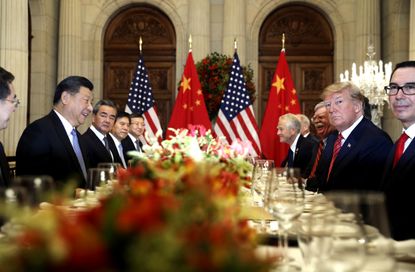Will Chinese negotiators 'extract their pound of flesh'?
And more of the week's smartest perspectives on the trade war

The smartest insight and analysis, from all perspectives, rounded up from around the web:
"The damage caused by President Trump's trade fight with China has spread further and faster than many expected," said Bloomberg News in an editorial. Factory orders are slumping on both sides. American farmers are feeling the pinch. Apple is suffering from China's slowing economy. As the sparring superpowers resume talks in Beijing this week, it's not the time for all-or-nothing gamesmanship. Both sides "ought to see there's a deal to be had — and should help each other seize it, even if it's less than perfect." American negotiators, who are threatening to boost Chinese tariffs beginning in March, are right "to maintain a poker face." China has been promising bold reforms for years without following through, even as state control over the economy has increased under President Xi Jinping. But "it would be counterproductive for the U.S. to press for outright capitulation, or to spin any emerging compromise as a crushing Chinese defeat." The two countries' economic fortunes are bound together. "Both sides ought to grant each other a face-saving exit from the mess they've made."
Apple may be "the canary in the global economy," said The Wall Street Journal in an editorial. The tech giant's troubles selling iPhones "underscore the interdependence of the U.S. and Chinese economies and their joint stake in a trade deal." Collateral damage from Trump's trade brawl can be seen throughout the world economy, from falling sales of U.S. auto brands in China to downward pressure on oil prices brought on by falling Chinese demand. Faced with uncertainty on trade, U.S. CEOs have already reduced capital spending. Trump "is probably right that China has more to lose in a trade war than we do," said Josh Barro at New York. China's economy may be more dependent on trade with the U.S. than the other way around. But there's plenty of foreseeable blowback to U.S. industry too.
Subscribe to The Week
Escape your echo chamber. Get the facts behind the news, plus analysis from multiple perspectives.

Sign up for The Week's Free Newsletters
From our morning news briefing to a weekly Good News Newsletter, get the best of The Week delivered directly to your inbox.
From our morning news briefing to a weekly Good News Newsletter, get the best of The Week delivered directly to your inbox.
Chinese negotiators won't fold easily and will look to "extract their pound of flesh," said Finbarr Bermingham at the South China Morning Post. Beijing's "crack team of trade negotiators is professional, productive, and ruthless." More than 100 Chinese officials are involved in the current talks, including Vice Premier Liu He, compared with just five or six U.S. negotiators. It's a message to the world that China is taking this seriously — and that the U.S. should take the blame if the talks fail. China wants a deal and will follow through, but the U.S. is approaching it with the bluster of a "New York real estate deal." China has already made concessions in the trade war, said Sui-Lee Wee and Keith Bradsher at The New York Times. Last month China resumed buying American soybeans, and it has cut tariffs on American cars. It's also considering a law that would "stop local officials from forcing foreign companies to transfer their technology as a cost of doing business," a key sticking point in trade discussions. But Beijing has combined a few real compromises, such as lower tariffs, "with nebulous promises, and it will be hard to ensure that China sticks to its commitments."
Sign up for Today's Best Articles in your inbox
A free daily email with the biggest news stories of the day – and the best features from TheWeek.com
Create an account with the same email registered to your subscription to unlock access.
-
 Crossword: April 19, 2024
Crossword: April 19, 2024The Week's daily crossword puzzle
By The Week Staff Published
-
 In what states is abortion legal, illegal, and in limbo?
In what states is abortion legal, illegal, and in limbo?In The Spotlight Where American states stand on abortion care
By Theara Coleman, The Week US Published
-
 Sudoku hard: April 19, 2024
Sudoku hard: April 19, 2024The Week's daily hard sudoku puzzle
By The Week Staff Published